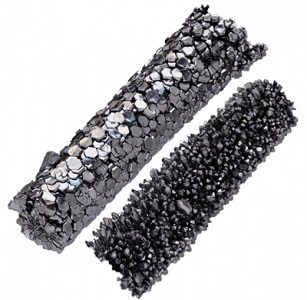Metal powders

Metal powders are often used in modern industry where pure metal is not applicable. Depending on the composition of the powders, they serve as the basis for various production technologies.
Molybdenum Powder
Molybdenum is a very refractory metal with a grayish color. The 42nd element in the Table of Mendeleev, has the following properties: density — 10.2 g/cm3, melting point +2620 ° C, boiling point of +4630 ° C. Among various products of this metal (sheets, wires, rods) molybdenum powder is widely used. The content of molybdenum in Molybdenum powder is approximately 99.5%, and 92% of powder grain size is 5 microns.
This powder serves as a raw material for producing compact molybdenum. Powder metallurgy is used to produce stacks of varying sizes for rolling wire, rods, and sheets. Molybdenum is also used as an additive to heat-resistant alloys to improve their properties.
Tungsten Powder
Tungsten is a refractory and hard, dark grey metal, element number 74 in the Mendeleev Table, has the following physical characteristics: density 19.3 g/cm3, melting point +3422 ° C and boiling point +5500 ° C.
Grades of tungsten powder are PVN, PVV, PVT, V. P. These products are produced in accordance with TU 48−19−72−92. Grain diameter of PVN is 3,5−6 microns, PVV is 0,8−1,7 microns, PVT is 3,5−6 microns. Up to 40% of PVN powder grains should be finer than 4 μm.
Tungsten powder is needed for production of compact metal. Powder metallurgy is used to produce stacks of different sizes from which wire, rods, and sheets are rolled. Characteristics of this metal allow to use it for creation of especially strong steels, heat-resistant and wear-resistant alloys, rods for welding, electric lighting equipment. Tungsten carbide is a particularly hard alloy of the BK type.
Tungsten carbide
It is a compound of tungsten (W) with carbon © with the formula — WC or W2 C. The main property of tungsten carbide is its great strength at high temperatures. Tungsten carbide is indispensable in the production of the hardest alloys. The most commonly used alloys are the BK series, specifically BK6 and BK8.
Tungsten
Tungsten is known to lead the class of the most refractory metals. It is surpassed only by carbon, which is not a metal and has a higher melting point. The main use of this metal is in the metallurgical industry, where W serves as the basis for the most refractory alloys and ultra-hard tools for percussive rotary drilling. It is widely used for making filaments in lamps, electron-beam tubes, in high-temperature-resistant crucibles, and targets of X-ray machines.
Pure metallic tungsten is very malleable and flexible, but any slightest admixture of carbon instantly makes it very hard. Tungsten does not yield to the action of chemical reagents; it is stable in nitric, hydrochloric acid and «aqua regia». It can only be dissolved in aqua regia or react with chlorine and sulfur if heated very strongly. Above 1400 °C tungsten reacts with carbon to form very hard tungsten carbide. It is used in heavy engineering to make superhard tools for milling and drilling.
Tungsten’s high density allows it to be used for making counterweights for cannon shells and bullet cores. Tungsten is used in high-temperature vacuum resistance furnaces as heating elements. An alloy of tungsten and rhenium is used as a thermocouple. Today, this metal is one of the leading heavy metals used in a variety of modern industries.
Molybdenum
Molybdenum is one of the few alloying elements that increase strength and resistance to corrosion. From time immemorial, this metal has been used in the manufacture of edged weapons in Japan.
Molybdenum products wire or ribbon are used for current input in light bulbs, creation of heating elements for high-temperature furnaces, various compounds of molybdenum such as sulfides, oxides and molybdates are used as catalysts and pigments for dyes. Molybdenum hexafluoride is used in the application of metallic Mo to various materials, MoS2 is used as a solid high-temperature lubricant.
Alloys of molybdenum, like the metal itself, have a very high elasticity index, a small expansion coefficient, remarkable resistance to temperature and a small thermal neutron capture cross-section. The electrical conductivity of molybdenum is somewhat lower than that of copper, but surpasses that of iron. It is slightly inferior to tungsten in terms of strength, but easier to work with pressure.
Mo is used extensively in aviation, space, industrial chemicals, metallurgy, defense industry, glass and ceramics. The percentage of the metal in the Earth’s crust is 4% and it does not occur naturally. The majority of all molybdenum mined is used in the manufacture of alloying additives for iron or steel alloys and the like.
Supply
Evek GmbH stocks a wide range of metal powders of the highest quality. All powders are certified. The technical documentation includes data on the chemical composition and the limiting percentage of impurities. We accept orders for metal products at the best price We can buy in bulk any semi-finished products for large-scale production. We also offer the best conditions for retail customers. The high level of service and responsiveness of service is the face of our company.
Buy at the best price
We provide for sale an unlimited range of metal powders of the highest quality at a competitive price. If you find it difficult to choose, our experienced managers are always available and ready to provide advice. Order with us and you will receive certified products that meet international quality standards in the shortest possible time. If you value your time, contact our nearest office today or place your order online.
